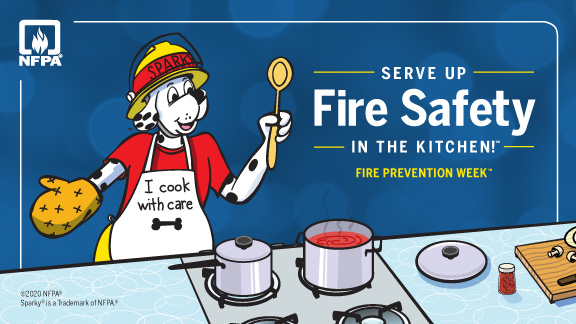FIRE PREVENTION WEEK: SERVE UP FIRE SAFETY IN THE KITCHEN

Since 1922, the National Fire Protection Association (NFPA) has sponsored the public observance of Fire Prevention Week. In 1925, President Calvin Coolidge proclaimed Fire Prevention Week a national observance, making it the longest-running public health observance in our country. During Fire Prevention Week, children, adults, and teachers learn how to stay safe in case of a fire. Firefighters provide lifesaving public education in an effort to drastically decrease casualties caused by fires.
Fire Prevention Week is observed each year during the first week of October in commemoration of the Great Chicago Fire, which began on October 8, 1871, and caused devastating damage. This horrific blaze killed more than 250 people, left 100,000 homeless, destroyed more than 17,400 structures, and burned more than 2,000 acres of land.
During the month of October, the North Lake Tahoe Fire Protection District (NLTFPD) will be coordinating with our schools from a distance to provide educational materials and videos to our teachers so they can share with their students online. We will miss seeing our students in person this year at the fire station and hope that everyone is staying safe and following the COVID-19 guidelines so we can see each other soon on the other side of this.
This year’s Fire Prevention Week campaign, “Serve Up Fire Safety in the Kitchen!” works to educate everyone about simple but important actions they can take to keep themselves and those around them safe.
According to NFPA, cooking is the leading cause of home fires and home fire injuries in the United States. Almost half (44%) of reported home fires started in the kitchen. Two-thirds (66%) of home cooking fires start with the ignition of food or other cooking materials.
NLTFPD encourages all residents to embrace the 2020 Fire Prevention Week theme.
“The most important step you should take before making a meal is to “Serve Up Fire Safety in the Kitchen!” said Fire Chief, Ryan Sommers. “A cooking fire can grow quickly. I have seen many homes damaged and people injured by fires that could easily have been prevented.”
NLTFPD wants to share safety tips to keep you from having a cooking fire.
- Never leave cooking food unattended. Stay in the kitchen while you are frying, grilling, or broiling. If you have to leave, even for a short time, turn off the stove.
- If you are simmering, baking, roasting, or boiling food, check it regularly, remain in the home while food is cooking, and use a timer to remind you that you are cooking.
- You have to be alert when cooking. You will not be alert if you are sleepy, have taken medicine or drugs, or consumed alcohol that makes you drowsy.
- Always keep an oven mitt and pan lid nearby when you are cooking. If a small grease fire starts, slide the lid over the pan to smother the flame. Turn off the burner, and leave the pan covered until it is completely cool.
- Have a “kid-free zone” of at least 3 feet around the stove and areas where hot food or drink is prepared or carried.
For more general information about Fire Prevention Week and cooking fire prevention, visit www.fpw.org.